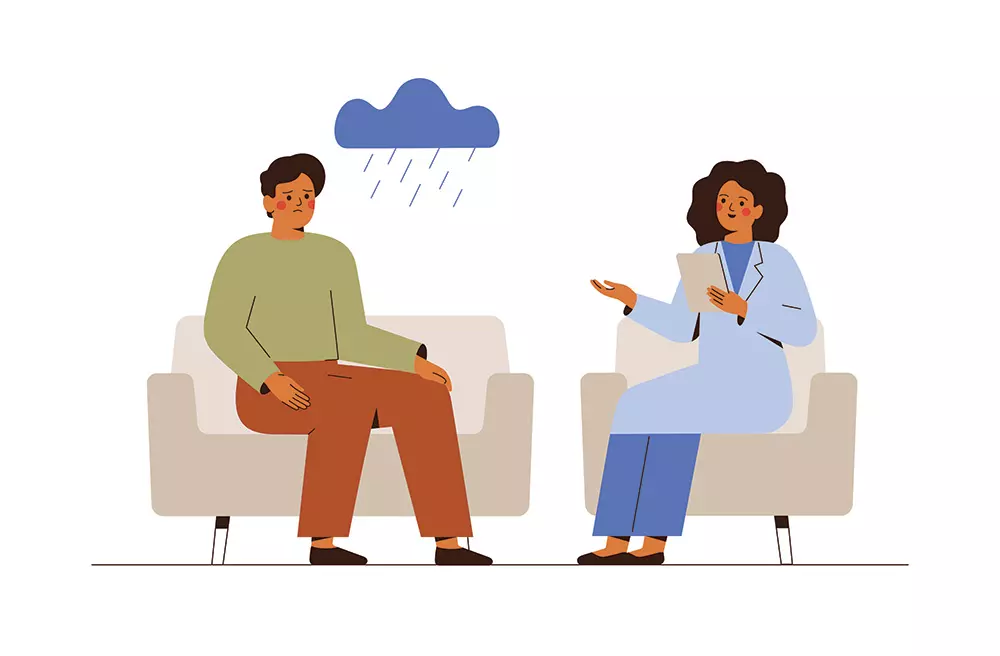When you’re experiencing depression, you just want to find relief. The symptoms can vary, but oftentimes, people with depression will feel sadness, hopelessness, worthlessness, less interest in the things they love, and more. These symptoms can be extreme enough to affect day-to-day life.
If you’re someone with depression who is looking for answers, know that sleep can play an important role in your symptoms. Many who struggle with depression also struggle with sleep, and according to medical professionals, trying to improve sleep quality can lessen other symptoms of depression. Let’s discuss the correlation between sleep and depression in more detail.
While sleep is a daily function, the quality and quantity of sleep can affect mood states and vice versa. Poor sleep can increase the risk for or worsen symptoms of depression for a number of reasons. For one, not getting an adequate amount of sleep can make it harder for you to regulate your emotions. Unstable sleep can also contribute to common symptoms of depression such as trouble with focus, memory, energy and motivation.
Issues with sleep are also common symptoms of depression. Many struggling with depression find that their stressors and negative thoughts can carry more weight at night. This can make it harder to fall asleep since it can feel impossible to turn your brain off. Sleep quality also worsens, with less time spent in deep, restorative stages of sleep and more time in lighter stages which can increase the risk for waking up throughout the night. In addition to insomnia, there is a correlation between symptoms of depression and other sleep-related concerns such as sleeping too much, or hypersomnia, and obstructive sleep apnea, which is a disease where people stop breathing for short periods during the night.
Another concern related to depression and sleep is that some people struggling with depression self-medicate with alcohol and substance use. While this can help some people fall asleep faster, it often leads to worsening of sleep quality and increased depressive symptoms.
There are multiple different approaches to managing symptoms of both depression and sleep impairment. One approach is to utilize medications to try and reduce symptoms. Some medications used to treat depression and insomnia include trazodone and mirtazapine. Medications can also help improve symptoms of depression and hypersomnia, such as bupropion or Wellbutrin. To note, some medications that treat depression can have initial effects of worsening sleep. Most often these symptoms resolve over time and sleep quality overall improves, but it is important to discuss with your prescriber before and during treatment.
While medications can be helpful, there are other routes to improving both symptoms of depression and sleep impairment. One excellent method is called cognitive behavioral therapy, or CBT. CBT is a technique that can help people identify negative thoughts and change thinking behaviors. For insomnia, CBT-I, or cognitive behavioral therapy for insomnia can help you make behavioral changes that make it easier to fall asleep, improve the quality of sleep and prevent thoughts/worries from affecting sleep.
For those struggling with depression and obstructive sleep apnea, using a continuous positive airway pressure, or CPAP, can improve sleep and reduce risk for and severity of depressive symptoms.
Besides therapy and medication, there are some behavioral techniques you can do to improve sleep, which in turn can prevent or reduce symptoms of depression. We will outline a few below:
It is scientifically proven that having a set sleep schedule improves the quality and the amount of rest that you’ll get. While everyone has a different natural circadian rhythm, setting a consistent bedtime and waking time based on what works best for your body makes it easier to fall and stay asleep and have more slow-wave, or restorative, sleep.
Keeping a bedroom quiet, dark and comfortable is helpful for a good night’s sleep since it makes it easier to fall asleep and less likely to wake up throughout the night.
Eating right before bed produces more energy which signals to your brain you’re ready to get moving. So, if you’re trying to rest, don’t eat late at night — it messes up your circadian rhythm.
As you might expect, consuming caffeine will keep you up at night. It’s best to stop drinking caffeine about eight hours before you go to sleep.
To sleep better, you’ve got to wear yourself out. When you work out during the day, you’re more likely to sleep better because exercise tires you out and produces endorphins. However, it is safest not to exercise excessively right before bed as that can give you energy, so try to exercise at least 1-2 hours before trying to go to sleep.
When you start to see issues with your sleep and quality of life, it’s time to seek out a healthcare professional. If you’re someone who struggles with using alcohol or substances to manage these symptoms, Eleanor Health can work with you to find alternative ways to treat insomnia, hypersomnia and depression. For more information, contact us.
 Natural Treatments for Depression: Can They Help?
Natural Treatments for Depression: Can They Help?
 Do I Have Depression?
Do I Have Depression?
 Alcohol and Depression: A Cycle
Alcohol and Depression: A Cycle